> Download bios > Biografien runterladen
“A daring and exciting performer who ventures courageously into unknown territory with relish.” – The Irish Times
Gwendolyn Masin is one of today’s significant concert violinists and an innovator in classical music. She performs to critical acclaim, her concerts taking her all over Europe and the United States, as well as Asia, South Africa, and the Middle East. As a fourth-generation musician, born into a family of string players and pianists, she creates collaborative music programmes and opportunities since an early age.
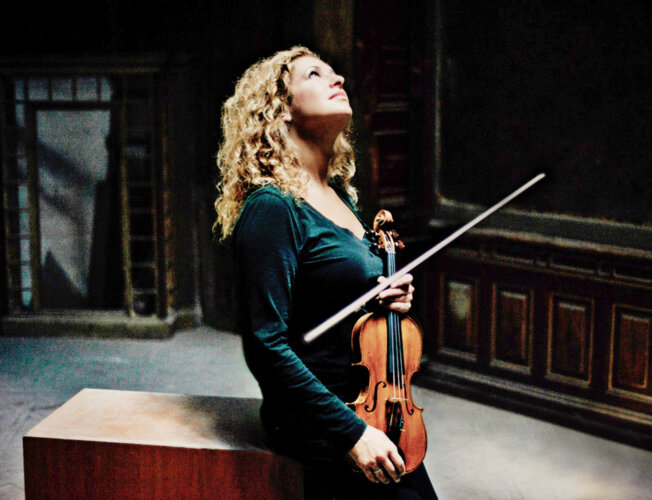
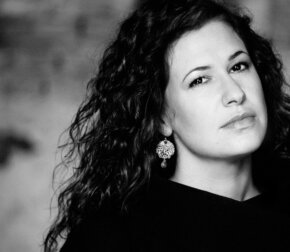
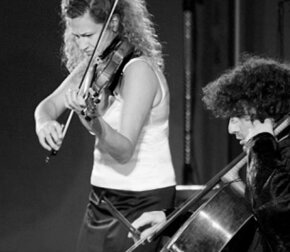
> Download bios at the end of the page > Biografien runterladen am Ende der Seite
“She sets first-rate standards in concert performance with her technically superior, refined, intensive and richly contrasting expression.” – Der Bund
Extensive tours and live recordings include concertos and virtuoso repertoire with the Bernese Symphony Orchestra, National Symphony Orchestra of Ireland, RTÉ Concert Orchestra of Ireland, Irish Chamber Orchestra, the Hungarian National Philharmonic as well as its Chamber Orchestra, MÁV Symphony Orchestra, Savaria Symphony Orchestra, Concerto Budapest Symphony Orchestra, Savannah and Georgia Philharmonic Orchestras, Charleston Symphony Orchestra, Saint Petersburg State Symphony Orchestra, Belarusian State Academic Symphony Orchestra, Musica Viva Chamber Orchestra (Moscow), Orquesta de Cámara de Bellas Artes (México), and youth orchestras such as the National Youth Orchestra of Ireland and Portugal’s Concerto Moderno with whom she recorded the Bach Violin Concertos.
“Gwendolyn Masin impresses, guaranteed to lift your spirits with her luxuriant sound.” – The Arts Desk
Gwendolyn is a recording artist for Naxos and Orchid Classics. Her albums include solo appearances with and without orchestra, chamber music, as well as a perennial partnership for live performances at the GAIA Music Festival. Her discography covers virtuoso, classical, and romantic repertoire including neglected works by Irene Wieniawska or Zara Levina and much-loved favourites such as Leonard Bernstein’s “West Side Story”. The latter was voted amongst the top five releases of 2020 by Art Muse London.
“To Masin, sound is the last step toward making music.” – The Journal of Music
As a commissioner for contemporary music, Gwendolyn has premiered works by, amongst others, Antoine Auberson, Raymond Deane, Thorsten Encke, Thomas Fortmann, Ákos Hoffman, Don Li, Urs Peter Schneider, Daniel Schnyder, Eric Sweeney, Dobrinka Tabakova, Martijn Voorvelt, and John Buckley, the latter of whom dedicated his first violin concerto to her. Buckley’s concerto premiered in Savannah, Georgia, as the Savannah Philharmonic’s season opener to a sold-out Lucas Theatre and was later performed in Dublin with National Symphony Orchestra of Ireland. She also has collaborated closely with authors Lukas Hartmann and Meral Kureyshi on productions. She’s received support in such ventures from the Arts Council of Ireland, Swiss city and cantonal departments, UBS Bank and Mobiliar Insurance Company, and broadcasting companies such as SRF 2 Kultur (Switzerland), VPRO and NPO Radio 4 (the Netherlands), RTÉ television and RTÉ lyric FM (Ireland).
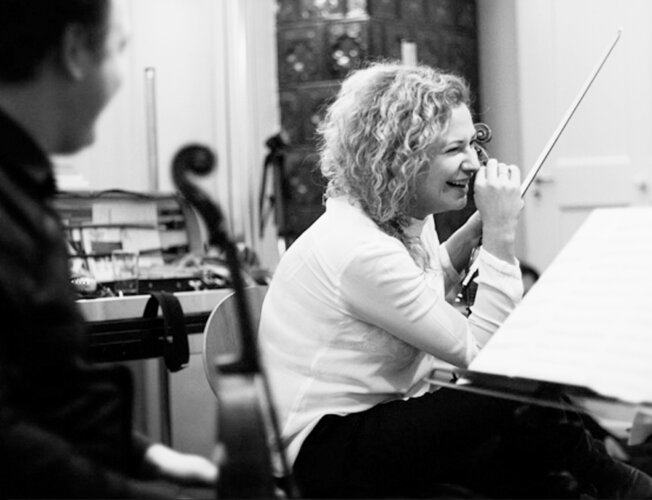
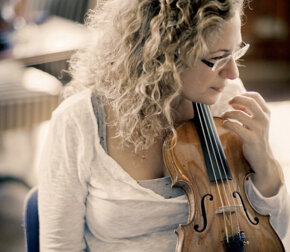
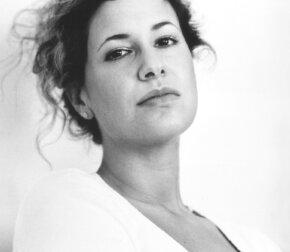
“A formidable talent that demands attention.” – The Irish Times
Celebrated for her versatile programming, Gwendolyn is founding artistic director of GAIA Music Festival. Since its inception in 2006 in Stuttgart, GAIA presents renowned artists alongside rising stars in conceptually-driven events that are created at the festival. The annual festival held in Switzerland since 2009 is recognised as one of the country’s most important. She established the multidisciplinary series, In Search of Lost Time in 2004 which has taken place in numerous cities in major halls in Ireland as well as in Berne, Switzerland. Notable artistic partnerships include her own series for Casino Bern, Cocktail für die Musen, for which Gwendolyn creates elaborate, one-off productions involving classical music and other music genres and art disciplines since 2018. Gwendolyn is artistic director of the International Chamber Music Series, and artistic director and faculty member of the International Master Course (NCH IMC) at Dublin’s National Concert Hall. Faculty members of the NCH IMC summer festival academy have included Mihaela Martin, Frans Helmerson, Lars Anders Tomter, Gary Hoffman, Kim Kashkashian, Gilles Apap, Adrian Brendel and Maximilian Hornung. In addition, Gwendolyn was appointed Artistic Director for Ireland’s Carrick Music Festival in 2007, a post she held for three years.
“She is as one with her instrument and enchants her audience.” – Thuner Tagblatt
Chamber music plays an important role in her musical life. She has collaborated with violinists Mihaela Martin, Philippe Graffin, Ilya Gringolts, Jan Talich, Kirill Troussov, Isabelle van Keulen and Maxim Vengerov; violists Kim Kashkashian, Vladimir Mendelssohn, Lars Anders Tomter, Maxim Rysanov, Gérard Caussé and Lilli Maijala; cellists Gary Hoffman, Adrian Brendel, Natalie Clein, Gavriel Lipkind, Frans Helmerson, Torleif Thedéen, Julian Steckel, and István Várdai; pianists Kit Armstrong, Silke Avenhaus, Aleksandar Madzar, Cedric Pescia, Alexander Lonquich, Hannes Minnaar, Pascal Rogé, Peter Frankl, and György Sebök; wind instrumentalists Reto Bieri, Jacques Zoon, Hervé Joulain, Christoffer Sundqvist, and Kaspar Zehnder; singers Rachel Harnisch and Andreas Schaerer; electric bass player Wolfgang Zwiauer; and guitarist Kalle Kalima. She frequently partners with pianists Simon Bucher, Finghin Collins, and Caspar Vos. In 2007, she co-founded the Lipkind Quartet with the quartet’s namesake cellist, of which she remained a member until 2009. The quartet performed with frequency in Germany, Belgium, the Netherlands, Switzerland, and Japan during that time. Festival appearances include Budapest, Prague, and Seoul Spring Festivals, Festival Internacional de Santander, West Cork Chamber Music Festival, Stellenbosch International Chamber Music Festival, IMS Prussia Cove, International Music Festival Koblenz, Internationaal Kamermuziekfestival Schiermonnikoog, and Storioni Festival.
“Bubbling and crackling with mischief, an engaging communicator.” – The Irish Times
Early experience with teaching sparked an holistic interest in communication through the art of music. This has led to myriad expressions of how she presents music. Violin in hand, she has been a keynote speaker at platforms as diverse as international conferences of the European String Teachers Association, TEDxBern, TU Dublin’s Conservatory of Music and Drama, the Royal Irish Academy of Music, Conservatório de Música da Metropolitana Lisbon, and a string of colleges in North America including Princeton University, Berklee College of Music, Georgia Southern University Armstrong Campus and the Faculty of Music of Universidad Nacional Autónoma de México (UNAM).
Gwendolyn has been a jury member at Murten Classics and Kiwanis Musikpreis (Switzerland) and adjudicates for Kalaidos’ University of Music.
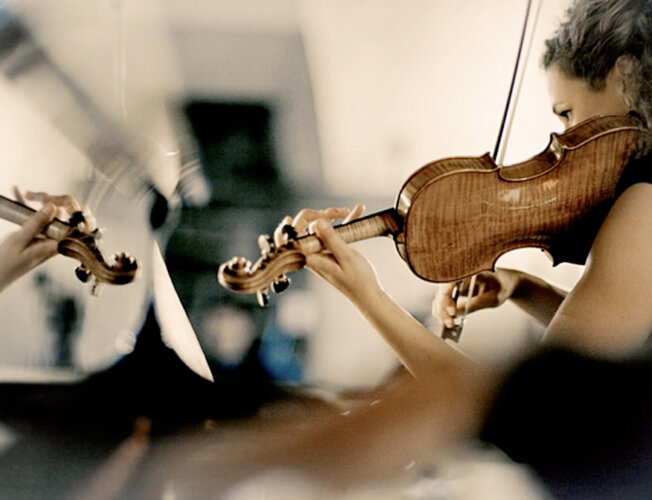
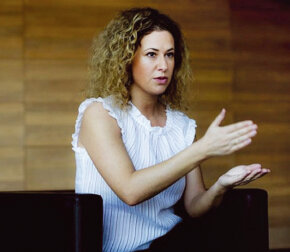
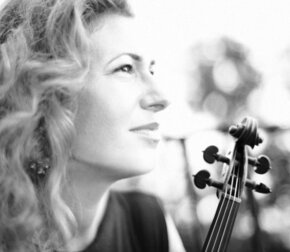
“Rarely, if ever before, have I read such a competent, inspiring and amusing book on how children learn to play the violin.” – üben & musizieren, Schott Verlag
At age twelve, Gwendolyn first began travelling back and forth between Dublin and Amsterdam to have regular lessons with Herman Krebbers. She discovered her curiosity for teaching during that time and began chronicling all her lessons, resulting in a vast library of written and recorded documentation. Gwendolyn would be one of Krebbers’ last students. In conversation with Schott Verlag she observed, “I have had the privilege of learning from and collaborating with some of the most acute musical minds of our time. This immersive understanding is of such value that I feel I owe it to the next generation to pass on traditions and ideas that were shared with me.” In 2009, the award-winning, Michaela’s Music House, The Magic of the Violin, was published. At the time of printing, it marked her as the youngest female violinist to have penned her own method. Michaela’s Music House includes her own studies and compositions and is available in English and German as part of the ESTA Edition collection available via Müller & Schade. Gwendolyn’s articles have been published in The Strad Magazine and other trade journals. Her doctoral thesis from Trinity College traces, in its first half, a history of written documentation about the violin from 1750 until today. Drawing on personal experience with outstanding violinists including her own teachers, as well as representatives of all the main schools of violin playing such as Boris Kuschnir, Thomas Brandis, Ljerko Spiller, Sándor Végh, Gerhard Schulz and Nora Chastain, the second half of the thesis is a chronicle of the contemporary history of violin, and it examines the similarities and differences within 20th-century violin pedagogy.
Gwendolyn teaches violin and chamber music masterclasses at institutes and festivals throughout Europe and North America. These include invitations to Hochschule für Musik Saar, Hochschule für Musik Franz Liszt Weimar, Franz Liszt Academy of Music Budapest, Utrecht Conservatory, and the University of Hong Kong Department of Music. From 2013 to 2021, Gwendolyn was professor and researcher of violin studies at the Haute École de Musique de Genève, Switzerland.
“The Exhale is a place to begin an inward journey to understanding, without outward expectation.” – in conversation with the BBC Music Magazine
In 2020, as a response to COVID-19, Gwendolyn brought her in-person retreat, The Exhale, online. The Exhale provides professional courses and holistic masterclasses to musicians, practitioners, and artists from across the globe. During its two-year online presence, it employed a team of 90 artists, and created more than 1,000 hours of classes, attracting more than 2,000 participants. Faculty members include prominent musicians from all over the world, including cellist Guy Johnston, violinists Géza Szilvay, and Body Mapping educator Jennifer Johnson, violists Maté Szücs and Matthew Jones, bassist Leon Bosch, jazz pianist Charl du Plessis, singer Roderick Williams, conductor and bassoonist Peter Whelan and children’s book author PJ Lynch.
“The space between notes creates the poetry within music.” – in conversation with NRC Handelsblad
Gwendolyn began “Gwendolyn’s Bridge Club” in 2021. Patrons of the club are invited to salon gatherings and boutique mixed art and performance events several times a year. The club democratises the delivery of music and the arts.
Since 2022, Gwendolyn is on the executive board of the Music Instrument Fund of Ireland, which celebrates its 30th anniversary in 2025.
The 2023/2024 season sees Gwendolyn premiering and touring “The Journey”. The production is a melodrama that she conceptualiced, developed, and produced with writer Lukas Bärfuss, who plays his first acting role in it. Featuring her ORIGIN Ensemble, “The Journey” will play twelve times in Switzerland and Liechtenstein during the course of the season. Further performances include solo appearances in Turkey and Hungary with Animae Musicae Chamber Orchestra; in Prague with the Slovak State Philharmonic; and in Lucerne as part of a mentoring partnership with the HSLU – Hochschule Luzern – Musik. Collaborations involve chamber music performances in Braga, Portugal; recitals with piano partners Caspar Vos and Simon Bucher, and artist residencies with writer Meral Kureyshi. Festival appearances include concerts in Stellenbosch, South Africa and klang in Switzerland.
“Outstanding playing. She successfully avoided the pitfalls of child prodigy status to become a profoundly inspiring musician .” – The Sunday Business Post
At age three, Gwendolyn began playing the piano, taught by her maternal grandmother. For her fifth birthday she received a violin. A year later she made her debut in Budapest’s Liszt Ferenc Academy playing Bach’s A minor concerto for violin.
Her father is a former concert master of the Netherlands Philharmonic Orchestra, her mother a violist and founding member of the Amsterdam Kern Ensemble. Both parents are EMI recording artists. As ambassadors of music in the Netherlands for decades, Yehudi Menuhin, David Oistrakh, Henryk Szeryng, Ida Haendel, Herbert Blomstedt and Radu Lapu, amongst others, regularly sat down at the Masin family’s dinner table.
Gwendolyn’s family moved a lot during her childhood years — from Gwendolyn’s birthplace of Amsterdam to Cape Town, where Gwendolyn’s mother established a strings school for children of all backgrounds. Some years later, because of the family’s anti-apartheid views, the Masins moved to Budapest, home to the maternal side of Gwendolyn’s family. Vivid memories of that time include watching the fall of Communism as soldiers left the city in tanks; snow blackened by the pollution of cars in winter and hours spent training on a ballet barre in the music school’s gymnasium as part of the physical movement programme that the Béla Bartók Conservatory offered its students.
The Masins moved to Dublin during a time when The Troubles were still felt in Ireland’s capitol. Following a string of concerts in halls such as the Netherland’s Concertgebouw and Muziekcentrum Vredenburg, South Africa’s Baxter Theater, Cape Town City Hall, and the major concert halls around Hungary, Gwendolyn gained national exposure in Ireland when she appeared on The Late Late Show, a popular weekly TV show.
Gwendolyn is winner of prizes at the Violin Days in Cape Town, Nederlands Vioolconcours (Iordens), the Carl Flesch Prize (Baden-Baden), and received a Swiss Government Excellence Scholarship, the Outstanding Young Persons of Switzerland Award, and first prizes at all the major Irish music competitions.
Gwendolyn holds degrees with highest honours from the Royal Schools of Music in London, England; the Hochschule der Künste in Berne, Switzerland; the Musikhochschule in Lübeck, Germany, and a PhD from Trinity College, Ireland. Her teachers include her parents, Herman Krebbers, Igor Ozim, Ana Chumachenco, Zakhar Bron and Shmuel Ashkenasi. She is an affiliate of the Association for Body Mapping Education. The violinist has Dutch, Hungarian, Czech, Irish, South African, Swiss, and Jewish background, and speaks five languages. She has a son.
Gwendolyn’s love of playing is founded in her voracious curiosity to understand human nature, musical expression, and the psychological connection between both. She explains, “I feel that music is a perpetual companion and my life feeds and informs my love for it and vice-versa. The experience of live music is everything. To me, it’s the ultimate form of communication, moving us into dimensions that language, for example, cannot reach. A word is not a sentence, but a note can be an entire story.”







